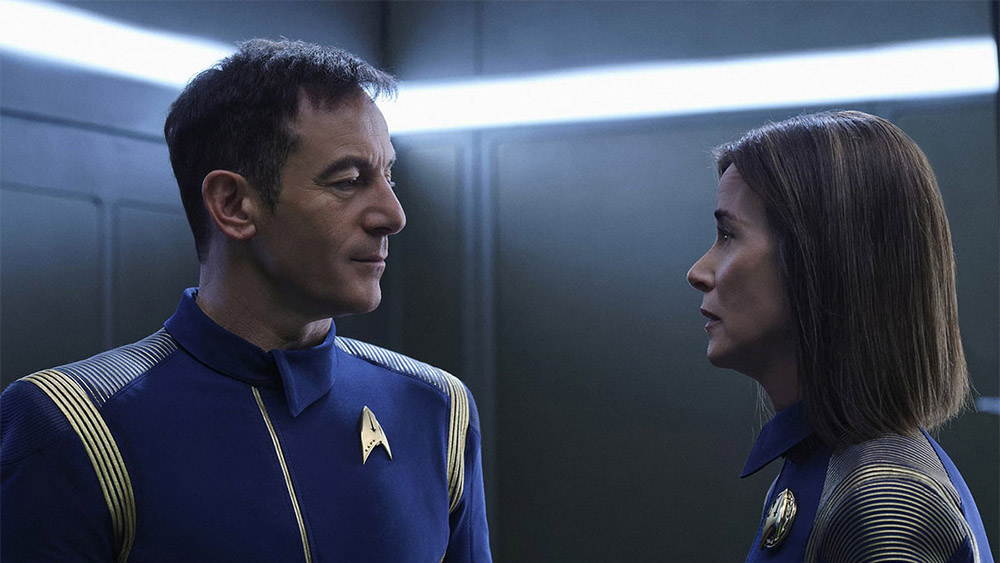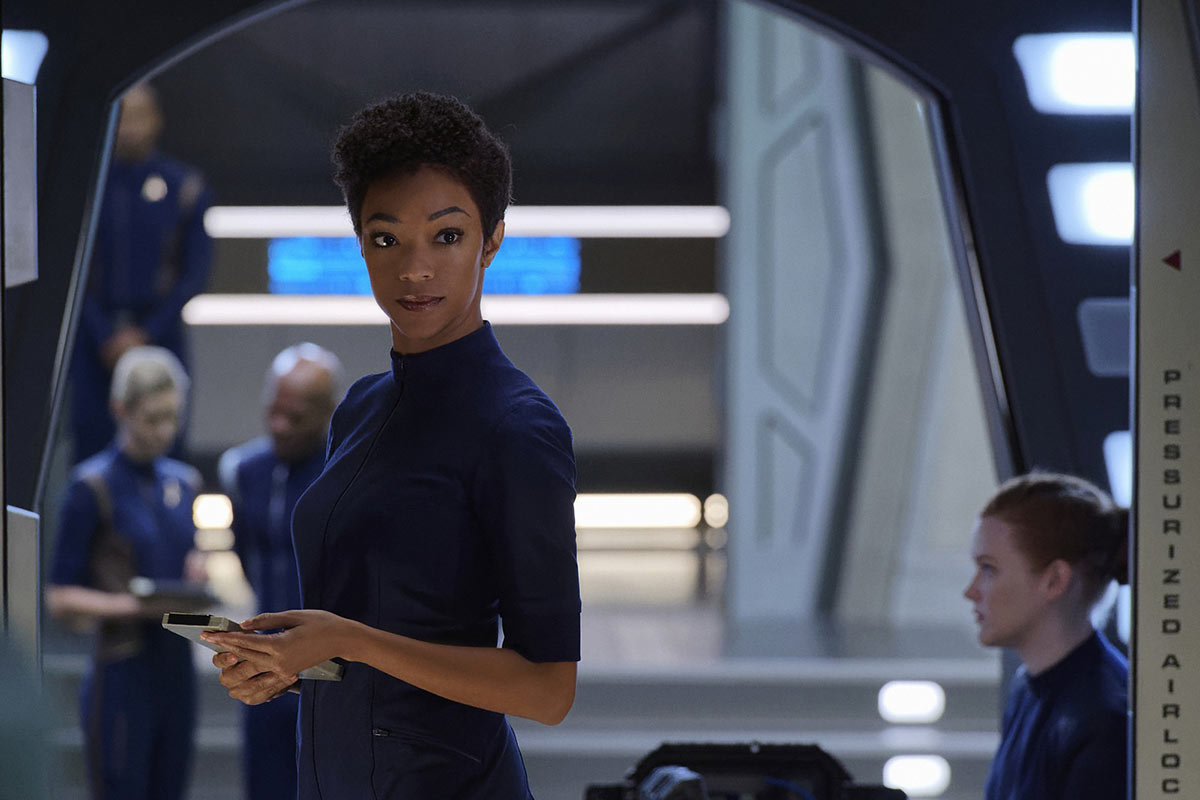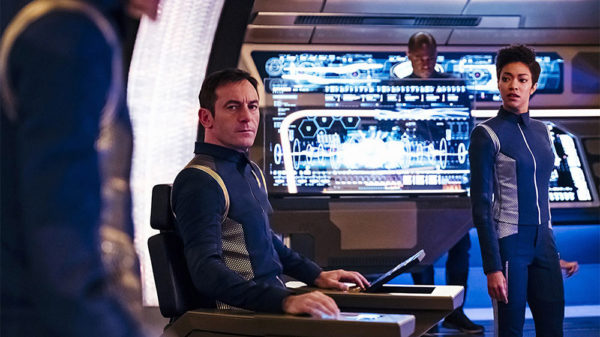Here’s our spoiler-filled review of Star Trek: Discovery episode 6, ‘Lethe’.
So, after last week’s revival of Trek characters past, ‘Lethe’ didn’t turn out to be another callback to the shows of old. Instead, it was a journey into the minds of Sarek, Burnham and Lorca – in one case, a very literal one.
With Sarek injured by a suicide bomber – one of a faction of logic zealots that we also learn targeted Burnham in her younger years, and were responsible for the learning centre bombing we have been shown glimpses of previously, and ultimately her Katra link with her adoptive father – Lorca takes it upon himself to ‘clean up’ the Vulcans’ ‘mess’ by sending Burnham, the newly recruited Tyler, and Tilly on an unauthorised rescue mission to save him.
As part of this attempt they come up with some psychedelia-creating mind-meld tech, which is put together by a very, erm… relaxed Lieutenant Stamets.
He has apparently responded to his encounter with the mycelium network last week by turning into something of an intergalactic hippy. Sadly, however, there were no mirrors around to allow us to judge whether his reflection has now dropped back into sync, but the reaction of Lorca to his new outlook was enough indication that not everyone is confident that his decision to replace the Tardigrade was a wise one.
Another doubter is Admiral Cornwell, who turns up in person to question the decision-making of Lorca, and basically find out what the hell is going on aboard the fleet’s secret weapon. In the process, this reveals to us a little more about her and Lorca’s personal history – well, actually quite a bit more.
Ultimately, their encounter reveals that – contrary to the steely military man front we have seen so far from the Discovery’s captain – Lorca is just as damaged, if not more so, than any other of the show’s protagonists and antagonists.
His paranoia and insecurity is seen in his quickness to draw a phaser even in the most intimate of circumstances, but Jason Isaacs’ eye-catching performance also sells a much deeper malady.
After his charm offensive has failed, and Cornwell has dished out a withering assessment of his current state of mind, the pleading to keep his ship taps into numerous portrayals of addiction and abuse – a needy pleading that cuts through the dialogue and speaks for itself.

Lethe, for those who are interested, is one of the five rivers of Hades in Greek mythology – and is linked with forgetfulness, oblivion and concealment. Lorca is perhaps further down that stream than anyone else here, but everyone is having revelations it would seem.
That particular dramatic moment, though, is greatly revealing and helps round out a three-dimensional view of a character that is rapidly becoming a wild-card in terms of narrative. Will Lorca genuinely make the right decisions, or will he transgress morals to protect the psychological crutch which Discovery appears to represent to him? Can he even be trusted to protect his own crew?
With the peril that befell Cornwell at the episode’s conclusion, these things have become a genuine narrative concern. His first response – to seek advice from Starfleet before heading off on a rescue mission – indicates that he is genuinely trying to change, but whether his ongoing decision making will be so clear is, well… unclear.
It’s the character beats like this – ditto Burnham’s revelation regarding how Sarek feels about her, and acceptance of her own human emotions; Tilly’s growing determination, and respect, for Burnham; Tyler’s observation about his new colleagues emotional turmoil amounting to ‘being human’ – that drive ‘Lethe’ rather than the action. That’s no bad thing. In fact it’s necessary, and vital to building a Star Trek story that can be embraced.
The most striking of the revelations revealed during Burnham’s trip into Sarek’s mind, though, is probably her adopted father’s decision to favour his son Spock’s chances of joining the Vulcan Expeditionary Group over his adoptive daughter’s. That decision, though presented to him as a near-impossible choice, and having been made with logic at its heart, has caused ripples through all three lives, which – as Burnham points out to him – will certainly be revisited too.
It also adds gravitas to Spock’s rejection of any such option, and decision to follow his adoptive sister into service with the Federation.

‘Lethe’ is an exploratory away mission episode, at heart. However, rather than beaming down to a planet to resolve a situation, the exploration is internal.
It’s all nicely done, too. There are some great effects – including a lovely bit of Doctor Strange inspired weirdness – plenty of gripping dialogue and revealing encounters. Best of all though, it has a satisfying conclusion that allows Burnham, Lorca, Tilly and Sarek get real progression as characters, though the first of those benefits most.
Her symbolic reset of attitude to life aboard Discovery appears to be a big moment, setting her up as the central protagonist she deserves to be. Having been adopted by Sarek, Georgiou and now Lorca, she is seemingly looking beyond failed attempts to be Vulcan, and is now trying to make a success of being human. The hero’s path? Hopefully.
It’s a conclusion that poses interesting questions about where all this is going to end up as the many layers of the narrative and its themes continue to stack up. As Discovery has moved on, it has made a great fist of shifting the emphasis away from Martin-Green’s Micheal Burnham, slowly revealing an ensemble cast that has picked up the narrative threads given to them and is now an impressive unit.

